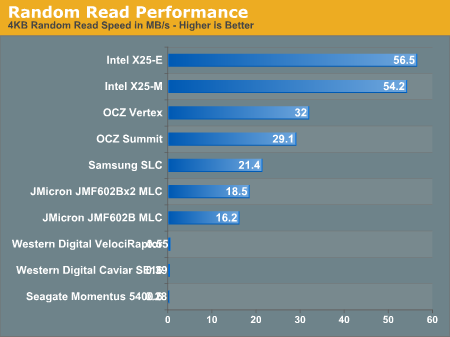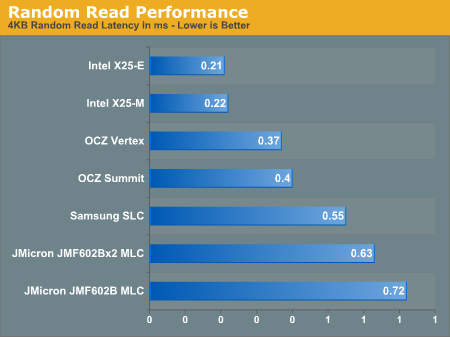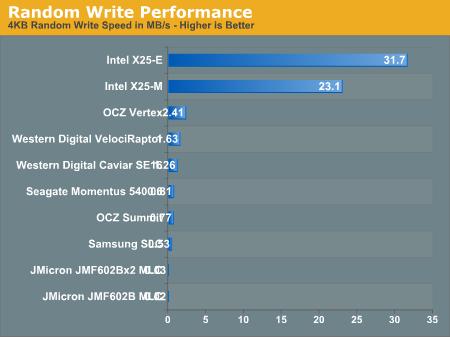The SSD Anthology: Understanding SSDs and New Drives from OCZ
by Anand Lal Shimpi on March 18, 2009 12:00 AM EST- Posted in
- Storage
Random Read/Write Performance
Arguably much more important to any PC user than sequential read/write performance is random access performance. It's not often that you're writing large files sequentially to your disk, but you do encounter tons of small file reads/writes as you use your PC.
To measure random read/write performance I created an iometer script that peppered the drive with random requests, with an IO queue depth of 3 (to add some multitasking spice to the test). The write test was performed over an 8GB range on the drive, while the read test was performed across the whole drive. I ran the test for 3 minutes.

The three hard drives all posted scores below 1MB/s and thus aren't visible on our graph above. This is where SSDs shine and no hard drive, regardless of how many you RAID together, can come close.
The two Intel drives top the charts and maintain a huge lead. The OCZ Vertex actually beats out the more expensive (and unreleased) Summit drive with a respectable 32MB/s transfer rate here. Note that the Vertex is also faster than last year's Samsung SLC drive that everyone was selling for $1000. Even the JMicron drives do just fine here.
If we look at latency instead of transfer rate it helps put things in perspective:

Read latencies for hard drives have always been measured in several ms, but every single SSD here manages to complete random reads in less than 1ms under load.
Random write speed is where we can thin the SSD flock:

Only the Intel drives and to an extent, the OCZ Vertex, post numbers visible on this scale. Let's go to a table to see everything in greater detail:
| 4KB Random Write Speed | |
| Intel X25-E | 31.7 MB/s |
| Intel X25-M | 23.1 MB/s |
| JMicron JMF602B MLC | 0.02 MB/s |
| JMicron JMF602Bx2 MLC | 0.03 MB/s |
| OCZ Summit | 0.77 MB/s |
| OCZ Vertex | 2.41 MB/s |
| Samsung SLC | 0.53 MB/s |
| Seagate Momentus 5400.6 | 0.81 MB/s |
| Western Digital Caviar SE16 | 1.26 MB/s |
| Western Digital VelociRaptor | 1.63 MB/s |
Every single drive other than the Intel X25-E, X25-M and OCZ's Vertex is slower than the 2.5" Seagate Momentus 5400.6 hard drive in this test. The Vertex, thanks to OCZ's tweaks, is now 48% faster than the VelociRaptor.
The Intel drives are of course architected for the type of performance needed on a desktop/notebook and thus they deliver very high random write performance.
Random write performance is merely one corner of the performance world. A drive needs good sequential read, sequential write, random read and random write performance. The fatal mistake is that most vendors ignore random write performance and simply try to post the best sequential read/write speeds; doing so simply produces a drive that's undesirable.
While the Vertex is slower than Intel's X25-M, it's also about half the price per GB. And note that the Vertex is still 48% faster than the VelociRaptor here, and multiple times faster in the other tests.










250 Comments
View All Comments
strikeback03 - Thursday, March 19, 2009 - link
I understand your point, but I am not sure you understand the point I (and others) are trying to make. The SSD makers (should) know their market. As they seem to be marketing these SSDs to consumers, they should know that means the vast majority are on Vista or OSX, so the OS won't be optimized for SSDs. It also means the majority will be using integrated disk controllers. Therefore, in choosing a SSD controller which does not operate properly given those restrictions, they chose poorly. The testing here at Anandtech shows that regardless of how the drives might perform in ideal circumstances, they have noticeable issues when used the way most users would use them, which is really all those users care about.tshen83 - Thursday, March 19, 2009 - link
In the history of computing, it was always the case that software compensated for the new hardware, not the other way around. When new hardware comes out that obsoletes current generation of software, new software will be written to take advantage of the new hardware.Think of it this way: you always write newer version of drivers to drive the newest GPUs. When is the last time newer GPUs work with older drivers?
Nobody should be designing hardware now that makes DOS run fast right? All file systems (except ZFS and soon BTRFS) are obsolete now for SSDs, so we write new file systems. I am not sure Intel X25-M's approach of virtualizing flash to the likings of NTFS and EXT3 is the correct one. It is simply a bridge to get to the next solution.
SSD makers right now are making a serious mistake pushing SSDs down consumer's throats during an economic crisis. They should have focused on the enterprise market, targeting DB servers. But in that space, Intel X25-E sits alone without competition. (Supertalent UltraDrive LEs should be within 25% of X25-E by my estimation)
pmonti80 - Thursday, March 19, 2009 - link
Now I understand what you meant in the beginning. But still I don't agree with you, the system reviewed is the one 99% of SSD buyers will use(integrated mobo controller + NTFS). So, why optimize the benchmark to show the bad drives in a good light?About the Vertex, I don't understand what you are complaining about. After reading this article most people got the idea that Vertex is a good drive and at half Intel's price (I know, I searched on google for comments about this article).
tshen83 - Thursday, March 19, 2009 - link
Professional people only look at two SSD benchmarks: random read IOPS at 4k and random write IOPS at 4k(Maybe 8K too for native DB pages).The Vertex random write IOPS at 4K size is abysmal. 2.4MB/sec at 4K means it only does 600ish random write IOPs. Something was wrong, and Vista/ICH10R didn't help. The 8GB/sec write boundary Anand imposed on the random write IOPS test is fishy. So is the artificial io queue depth = 3.
The vertex random write IOPS should be better. The random read IOPS also should be slightly better. I have seen OCZ's own benchmark placing the Vertex very close to Intel X25-M at random read/ write IOPS tests.
I personally think that if you use NTFS, just ignore the SSDs for now until Windows 7 RTM. You can't hurt waiting for SSD price to drop some more in the next 6 months. Same thing for Linux, although I would argue that Linux is even in a worse position for SSDs right now than windows 7. EXT3/EXT4/JFS/XFS/REISERFS all suck on SSDs.
gss4w - Thursday, March 19, 2009 - link
Anandtech should adopt the same comment system as Dailytech so that comments that don't make any sense can be rated down. Who would want to read a review of something using a beta OS, or worse an OS that is only used on servers? I think it would be interesting to see if Windows 7 beta offered any improvements, but that should not be the focus of the review.7Enigma - Thursday, March 19, 2009 - link
Here's another vote for the Dailytech comments section. The ability to rate up down, but more importantly HIDE the comments below a threshold would make for much more enjoyable reading.curtisfong - Wednesday, March 18, 2009 - link
Why should Anand test with Windows 7b or *nix? What is the majority OS?Kudos to Anand for testing real world performance on an OS that most use, and to Intel for tuning their drives for it. I'm happy the other manufacturers are losing business..maybe they will also tune their drives for real world performance and not synthetic benchmarks.
To the poster above: do you work for OCZ or Samsung?
Glenn - Wednesday, March 18, 2009 - link
tshen83 "A very thorough review by tshen83, an hour agoBUT, still based on Windows Vista.
"
As long as these drives are marketed toward said OS, why would you not use it? Most of us wouldn't recognize Solaris if we saw it! And I believe you seriously overestimate yourself if your gonna drill anything into Anands head! You might need your own site, huh?
Great Job Anand! Don't forget to remind these CEO's that they also need to provide any software needed to configure and optimize these drives to work properly. ie go to OCZ Forums and try to figure out how to align, optimize and keep your drive running like it's supposed to, in less than 4 hours of reading! It would be nice if these companies would do their own beta testing and not rely on early adopters to do it for them!
Roland00 - Wednesday, March 18, 2009 - link
It was a joy to read all 31 pagesMagicPants - Wednesday, March 18, 2009 - link
Anand it would be really helpful to have a list of SSD companies blacklisting you so I know which ones to avoid. In general it would be nice to know who doesn't provide review samples to reputable sites.